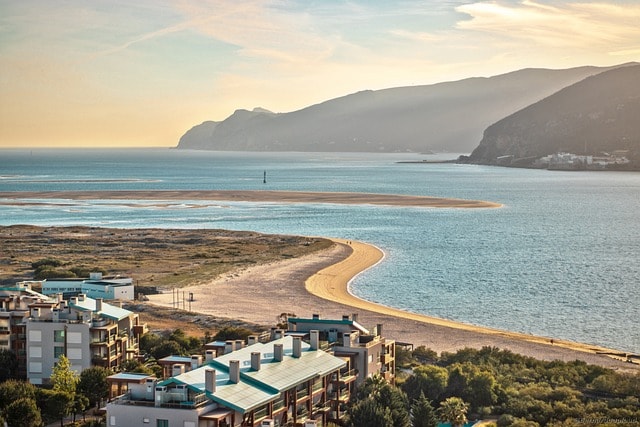Introduction

Moving to Portugal from UK?
This guide provides an overview of moving to Portugal from UK, focusing on residency in Portugal, the advantages of living in Portugal, tax benefits, and key visa options like the D7 visa Portugal. Learn how to navigate the process, find suitable properties, and settle into Portugal’s expat-friendly environment.
Article Summary
This comprehensive guide explores the essential aspects of moving to Portugal from UK, focusing on lifestyle benefits, tax advantages, and various residency options available to UK citizens. It provides essential details on climate, safety, healthcare and property markets, ensuring UK nationals have all the necessary information for a smooth transition.
Why Consider Moving to Portugal from UK?
Portugal is an attractive destination for British nationals due to its sunny climate, affordable living costs, and welcoming communities. Whether you are considering moving to Portugal from UK for retirement or work, the country offers something for everyone.
Advantages of Living in Portugal:
Warm Mediterranean climate with over 300 days of sunshine annually.
Lower cost of living compared to the UK, especially in housing and dining.
Excellent healthcare through both public and private systems.
Tax Benefits for Expats:
Non-Habitual Residency (NHR) offers 10 years of tax relief on foreign pensions.
No inheritance tax in Portugal for direct family members.
Portugal-UK double taxation treaty ensures income isn’t taxed twice, a key advantage for those moving to Portugal from UK.
Key Takeaways: Moving to Portugal from UK

-
Lifestyle Benefits: Enjoy a high quality of life with a Mediterranean climate, rich cultural heritage, and diverse recreational opportunities.
-
Tax Advantages: Benefit from Portugal’s favorable tax regime, including no wealth tax, inheritance tax, or capital gains tax on certain assets.
-
Residency Options: Various residency options, including the D2 Visa D7 Visa and D8 Visa cater to different needs.
-
Healthcare and Education: Access high-quality healthcare and education systems.
-
Property Market: Diverse property options, from luxury apartments to family homes, in regions like Lisbon, Porto, and the Algarve.
Background About Portugal and Its History

Portugal, located in southwestern Europe, is one of the oldest nations on the continent. It boasts a rich maritime history from the Age of Discoveries, a vibrant culture, and a mix of Roman, Moorish, and Christian influences.
How to Move to Portugal from the UK

Living in Portugal offers a unique blend of traditional charm and modern amenities. Portugal’s cities and coastal towns offer relaxed lifestyles, excellent public transport, and diverse activities, such as golfing and hiking.
Step-by-Step Process
- Apply for the Appropriate Visa:
The D7 visa Portugal is ideal for retirees or those with passive income. Freelancers may qualify for the D8 Digital Nomad Visa. - Secure a Portugal Residence Card:
Register with SEF (Portuguese Immigration) after arriving in Portugal. - Register for Healthcare:
Enroll in Portugal’s SNS for public healthcare access.
Key Documents
- Proof of sufficient income (e.g., pensions, savings).
- Accommodation details (rental or purchase agreements).
- Valid health insurance policy.
Residency in Portugal
Portugal offers a variety of residency options tailored for UK nationals, whether you’re a retiree, investor, or remote worker.
D7 Visa Portugal (Passive Income Holders)
For retirees and individuals with passive income, such as pensions or rental earnings, the D7 visa Portugal is a popular choice.
Key Features:
- Requires proof of sufficient income or savings, typically at least the Portuguese minimum wage.
- Allows dependents to apply for residency simultaneously.
- Provides a pathway to permanent residency after five years.
Digital Nomad Visa (D8)
Remote workers and freelancers can apply for the D8 Digital Nomad Visa.
Applicants must demonstrate:
- Proof of remote employment or freelance contracts.
- Minimum monthly income equivalent to four times the Portuguese minimum wage.
EU Family Reunion Visa
UK nationals married to or closely related to EU citizens can apply for the EU Family Reunion Visa.
- This visa is valid for one year and can be renewed.
- Allows family members to reside legally with their EU relatives in Portugal.
Lifestyle Benefits in Portugal
Expats who are moving to Portugal from UK often cite the relaxed lifestyle and excellent healthcare as key reasons.
Living in Portugal offers a perfect mix of traditional charm and modern amenities. With its Mediterranean climate, stunning beaches, and beautiful landscapes, Portugal is ideal for outdoor activities and relaxation. Portuguese cuisine, featuring fresh seafood and rich pastries, delights food lovers. The locals are known for their warmth and hospitality, ensuring newcomers feel welcome. The cost of living is relatively low, and the healthcare system is excellent, making Portugal an attractive destination for British citizens.
Climate in Portugal
Portugal boasts a Mediterranean climate with hot, dry summers and mild, wet winters. The Algarve region enjoys over 300 days of sunshine annually, making it a popular destination for those seeking warm weather year-round. The northern regions experience more rainfall, contributing to lush landscapes and green forests.

Safety in Portugal
Portugal consistently ranks high in global safety indexes. In the 2024 Global Residency Safety Index, Portugal ranks among the top 20 safest countries. Low crime rates and a stable political environment contribute to a secure living environment for residents and visitors. Violent crime is rare, and most reported incidents are minor thefts or petty crimes. Effective law enforcement and community-oriented policing play a significant role in maintaining this safety.
Schooling in Portugal
Portugal’s education system is well-regarded, offering both public and private schooling options. Public schools follow the national curriculum and are free for residents. Private and international schools provide diverse curricula, including the British and International Baccalaureate systems. Notable international schools include St. Julian’s School in Lisbon and the International School of the Algarve, making it easier for expat children to adjust.
Portugal also boasts several reputable universities, such as the University of Lisbon and the University of Porto, which offer a range of undergraduate and postgraduate programs. International students planning to study in Portugal are required to obtain a student visa, which involves meeting specific requirements and following the application process.
Healthcare in Portugal: Portuguese National Health Service
Portugal has an excellent Portuguese national health service with both public and private options available. The National Health Service (SNS) offers comprehensive coverage for residents, including general and specialist care, hospitalization, and emergency services. UK citizens with legal residency in Portugal can use the European Health Insurance Card (EHIC) until its expiry, and they also have the option to apply for a new UK-issued EHIC or GHIC. Private healthcare facilities are also widely available, offering shorter waiting times and a broader range of services. Major cities like Lisbon, Porto, and Faro have modern hospitals and clinics equipped with state-of-the-art medical technology. British citizens can access healthcare in Portugal through the SNS by registering with their local health center and obtaining a user number. Residents, upon proper registration, will have the same healthcare rights as a Portuguese citizen.
Additionally, private health insurance is available in Portugal, providing faster appointments and high-quality services at private clinics.
Property in Portugal
Investing in property in Portugal is a sound decision due to the stable real estate market. The country offers a range of properties, from luxurious villas to affordable apartments, catering to different budgets and preferences. The property market is well-regulated, providing security for buyers and investors.

Popular Locations
-
Lisbon: The capital city, known for its historic neighborhoods and vibrant culture. Popular districts include Alfama, Baixa, and Bairro Alto.
-
Porto: Famous for its wine, picturesque riverside, and historic architecture. Key areas include Ribeira, Foz do Douro, and Vila Nova de Gaia.
-
Algarve: Renowned for its stunning beaches, golf courses, and expatriate communities. Popular towns include Faro, Lagos, and Albufeira.
Popular Property Types
-
Luxury Apartments: Found in urban centers like Lisbon and Porto, often featuring modern amenities and scenic views. Prices for one-bedroom apartments in central Lisbon range from €200,000 to €400,000, while three-bedroom apartments can cost between €500,000 and €1,000,000. In Porto, one-bedroom apartments range from €150,000 to €300,000, and three-bedroom apartments from €400,000 to €800,000.
-
Family Homes: Available in suburban areas and coastal towns, ideal for families seeking more space. Prices for family homes in suburban Lisbon range from €300,000 to €600,000, while in coastal towns like Cascais, prices range from €400,000 to €800,000. In Porto, suburban family homes range from €250,000 to €500,000.
-
Villas: Common in the Algarve, offering spacious living and private amenities, often with pools and gardens. Prices for villas in the Algarve start at €300,000 and can go up to €2,000,000, depending on the location and amenities.
-
Commercial Properties: Investors looking for business opportunities can find commercial properties, including office spaces, shops, and hotels. Prices for commercial properties in central Lisbon start at around €500,000, while in Porto, they start at €400,000. In the Algarve, prices for commercial properties vary widely but generally start at €300,000.
Regional Differences
-
Lisbon: The capital city has higher property prices due to demand, with luxury apartments and historic properties being particularly sought after. One-bedroom apartments range from €200,000 to €400,000, and larger homes from €500,000 to €1,000,000.
-
Porto: Known for its wine culture and historic charm, Porto offers a mix of luxury apartments and traditional homes, with prices generally lower than Lisbon. One-bedroom apartments range from €150,000 to €300,000, and larger homes from €400,000 to €800,000.
-
Algarve: Offers more affordable options and a relaxed lifestyle, with a wide range of villas and family homes. One-bedroom apartments start at €150,000, and villas range from €300,000 to €2,000,000.
Market Trends and Investment Potential
The property market in Portugal has shown resilience and growth, driven by demand from both local and international buyers. Key factors include the country’s favorable tax regime and its appeal as a safe and desirable destination.
The Portugal Golden Visa offers significant benefits for investors, including residency rights and the potential for citizenship.
The Portuguese Golden Visa serves as a pathway to residency and citizenship, allowing investors to live, work, and study in EU/EEA countries.
Investing in property in Portugal is considered a sound decision due to:
-
Rental Income: High rental yields, especially in tourist hotspots.
-
Capital Appreciation: Steadily increasing property values.
Tips for Buyers in Portugal
-
Research Thoroughly: Understand market trends and property values in different regions.
-
Seek Professional Advice: Work with reputable real estate agents and legal advisors.
-
Inspect Properties: Visit and inspect properties personally or through a trusted representative.
-
Consider Future Developments: Look into planned infrastructure and development projects in the area, as these can impact property values.
By taking these factors into account and thoroughly exploring the diverse property options available, buyers can not only find a property that meets their needs but also uncover a valuable investment opportunity in Portugal.
Taxes and Financial Planning for UK Nationals
Navigating taxes is a crucial step for UK nationals moving to Portugal from the UK. Portugal’s favorable tax system provides significant advantages for expats.
Key Tax Benefits
NHR Scheme (Non-Habitual Residency):
- Offers tax exemptions for pensions and foreign income for 10 years.
- Reduces tax rates on certain types of Portuguese income.
No Wealth or Inheritance Tax:
- Immediate family members are exempt from inheritance tax in Portugal.
Capital Gains Tax Portugal:
- Standard rate is 28%, but reinvestment in Portuguese property can qualify for exemptions.
Portugal UK Double Tax Treaty
- Portugal UK Double Tax Treaty ensures UK nationals avoid double taxation on their income.
- Key provisions protect pensions, salaries, and other forms of income earned abroad.
- Taxpayers can credit taxes paid in one country against their liabilities in the other.
Retiring to Portugal from the UK
Portugal is among the most popular destinations for British retirees due to its welcoming communities and tax-friendly policies.
Benefits for Retirees:
Healthcare Access:
- Access to Portugal’s public healthcare system (SNS) is available for legal residents.
- Private healthcare options offer faster services.
Favorable Pension Taxation:
- Retirees benefit from the NHR scheme, exempting foreign pension income from taxation.
Affordable Property:
- Regions like the Algarve offer villas and family homes at competitive prices.
Cost of Living in Portugal
The cost of living in Portugal is significantly lower than in the UK, allowing expats to enjoy a high standard of living.
Additional Insights:
Housing Costs:
Property in the Algarve is ideal for retirees and expats looking for affordable yet scenic living options.
Transportation:
Public transport is efficient and costs around €40–€50 for monthly passes.
Utilities and Internet:
Average utility bills for an apartment are €100–€150 monthly.
Housing Costs
Renting or buying property in Portugal is more affordable compared to the UK. Monthly rent for a one-bedroom apartment in the city center of Lisbon ranges from €800 to €1,200, while outside the city center, it can be as low as €500. In Porto, city center rents for a one-bedroom apartment range from €600 to €1,000, and outside the center from €400 to €700. In the Algarve, rents are more affordable, with one-bedroom apartments ranging from €500 to €900, depending on proximity to the coast. Purchasing property offers even more long-term savings, with prices per square meter significantly lower than in the UK.
Food and Dining

Groceries and dining out are also cheaper in Portugal. Fresh produce, local meats, and seafood are abundant and affordable. Monthly grocery costs for a single person range from €150 to €250. A meal at an inexpensive restaurant costs around €10-€15, while a three-course meal for two at a mid-range restaurant averages €35-€50.
Transportation

Public transportation in Portugal is efficient and affordable, with buses, trams, and metro services widely available in major cities. Monthly passes cost around €40-€50. Owning a car is also common, with fuel prices lower than in many other European countries.
Utilities and Other Expenses
Utility costs, including electricity, heating, cooling, water, and garbage, for an 85m2 apartment average around €100-€150 per month. Internet and mobile phone services are also reasonably priced, with various plans available to suit different needs. Additionally, healthcare costs are lower than in the UK, with high-quality public and private options available.
By considering these factors, UK nationals can enjoy a comfortable lifestyle in Portugal at a lower cost than in the UK, making it a highly attractive relocation destination.
Visa for Portugal:
To move to Portugal from the UK, you will need to obtain a visa. There are various visa options available. It’s essential to choose the right visa based on your purpose of stay. Certain nationalities may be required to obtain an entry visa before getting a long-stay or permanent visa. Additionally, eligible relatives of Portuguese nationals or residents can apply for family reunion visas, which are valid for one year and can be renewed.

Visa Options for Non-EU Nationals
British citizens and other non-EU nationals have specific visa options that cater to different needs, including investment and employment opportunities. These secure permanent residency as well as free movement in the Schengen Area. UK citizens have various visa options, such as the Portuguese golden visa and D7 Passive Income Visa, which cater to different needs and circumstances.
D2 Visa (Entrepreneur Visa):
The D2 Visa is designed for entrepreneurs and independent service providers who wish to establish their businesses or practices in Portugal. Applicants must present a solid business plan, demonstrate the viability of their business, and show sufficient financial means to support themselves and their business during the initial phase. This visa is suitable for those intending to start a new company or relocate an existing business to Portugal.
D7 Visa: (Passive Income Visa)
The d7 visa is deal for retirees and those with passive income. Applicants must show a secured annual income or sufficient savings to support themselves during their stay. The minimum income requirement is equivalent to the Portuguese minimum wage, which must be proven through bank statements or other financial documents. A stable passive income must be deposited into a Portuguese bank account to meet the requirements for the D7 Visa.
D8 Digital Nomad Visa:
Portugal has introduced a visa specifically for digital nomads, allowing remote workers to live in Portugal while working for companies abroad. This visa requires proof of remote employment and sufficient income to support living expenses. The applicant must demonstrate a stable income source, provide proof of accommodation, and have health insurance coverage. This visa is ideal for freelancers, independent contractors, and remote employees who want to reside in Portugal.
The Portuguese Consulate plays a crucial role in the visa application process, including issuing baggage certificates and assisting with temporary D7 Visa and residence permit applications for individuals moving to Portugal from the UK.
Visa Options for EU Passport Holders
EU passport holders benefit from the freedom of movement within the EU, which simplifies the process of moving to Portugal. Citizens of the European Free Trade Association (EFTA) or EU countries can travel to Portugal using their valid EFTA or EU passports.
-
Residence Certificate (Certificado de Registo de Cidadão da União Europeia): EU citizens planning to stay in Portugal for more than three months must apply for a residence certificate. This is not a visa but a registration process that requires proof of employment, self-employment, or sufficient financial resources and health insurance.
-
Temporary Residence Permit: Similar to the residence certificate but for non-EU family members of EU citizens. This allows them to reside in Portugal with their EU relatives.
The Application Process
The visa application process involves submitting the necessary documents, such as a valid passport, proof of financial stability, and health insurance. It’s advisable to start the Portuguese consulate application process well in advance to ensure a smooth transition.
-
Determine Visa Type: Identify the visa type that suits your purpose of stay.
-
Gather Documents: Collect required documents, such as a valid passport, proof of financial resources, health insurance, and any additional documents specific to the visa type (e.g., employment contract for work visas).
-
Submit Application: Applications can be submitted at the Portuguese embassy or consulate in your home country or directly in Portugal if applicable.
-
Wait for Processing: Processing times vary depending on the visa type and individual circumstances.
-
Receive Visa: Once approved, you will receive your visa or residence permit, allowing you to stay in Portugal for the specified duration.
Specific Requirements for Key Visas for Portugal
-
D2 Visa:
-
Comprehensive business plan outlining the business’s viability.
-
Proof of sufficient financial means to support the business and personal living expenses.
-
Clean criminal record.
-
Health insurance.
-
Evidence of accommodation in Portugal.
-
D7 Visa:
-
Proof of sufficient income or savings to support yourself during your stay.
-
Minimum income equivalent to the Portuguese minimum wage.
-
Clean criminal record.
-
Health insurance.
-
Evidence of accommodation in Portugal.
-
D8 Digital Nomad Visa:
-
Proof of remote employment.
-
Sufficient income to support living expenses in Portugal.
-
Clean criminal record.
-
Health insurance.
-
Evidence of accommodation in Portugal.
By understanding the various visa options for Portugal and their requirements, you can choose the best path for moving to Portugal and ensuring a smooth and successful relocation.
Portugal Permanent Residence
Permanent residency in Portugal can be obtained after five years of temporary residency. It provides similar rights to Portuguese citizens, excluding the right to vote in national elections. Permanent residents can access healthcare, education, and social services under the same conditions as citizens.
Portugal Tax
Portugal is renowned for its favorable tax regime, making it an attractive destination for expatriates, retirees, and investors alike. The country offers several tax incentives and exemptions designed to encourage foreign investment and residency. Portugal’s double taxation treaties with numerous countries ensure that residents are not taxed twice on their income. These provisions, combined with Portugal’s relatively low cost of living and high quality of life, make it an appealing choice for individuals seeking to optimize their tax situation while enjoying the advantages of living in a vibrant and culturally rich European country.

Income Tax Portugal
Portugal offers a progressive income tax system with rates ranging from 14.5% to 48%. Residents and non-residents are required to pay tax on their income earned in Portugal. The Non-Habitual Resident (NHR) regime provides tax benefits for new residents, including reduced rates and exemptions on foreign income for the first ten years. This program is now closed save for very specific situations.
Additionally, foreign residents can benefit from the Double Taxation Agreement and favorable tax treatments under the NHR regime.
Capital Gains Tax Portugal
Capital Gains Tax (CGT) in Portugal is a significant consideration for property owners, especially expats contemplating selling their main residence. CGT is levied on the profit made from the sale of properties and other assets, with a standard rate of 28% for residents. However, there are potential exemptions and reductions that can significantly impact your financial outcome.
Understanding CGT for Expats in Portugal
The Non-Habitual Resident (NHR) status does not affect the taxation of Portuguese property sales. Both NHR and regular residents face the same tax treatment when selling property in Portugal. Despite the high tax rates, significant reliefs are available, particularly when selling your primary residence. It’s crucial to understand that these reliefs do not extend to rental properties sold in Portugal.
Applying for CGT Exemptions in Portugal
To qualify for CGT exemptions, certain criteria must be met. This includes the duration of ownership, the use of the property as a primary residence, and specific reinvestment conditions.
Reinvestment in Another Property in Portugal
A complete or partial CGT exemption is possible if you reinvest the sale proceeds into another property within the EU or EEA. The portion of the gain not reinvested will be subject to taxation. This option is beneficial for those looking to remain within the EU or EEA and maintain their property investments.
Reinvestment into a Pension or Long-term Savings Structure
This relief is particularly advantageous for individuals planning to downsize or relocate outside the EU or EEA. To qualify, you must be retired or over 65 years old, and the reinvestment must be made into a qualifying pension or savings structure. This strategy provides flexibility for managing finances while minimizing tax liabilities.
Maximizing CGT Exemptions for Expats
Effective tax planning is essential to maximize the benefits of CGT exemptions. This involves strategic financial planning around the timing of the sale, understanding reinvestment rules, and other financial considerations. Seeking professional tax advice can help optimize your tax benefits when selling property in Portugal.
By understanding and applying these exemptions and strategies, expats can significantly reduce their CGT liabilities and improve their financial outcomes when selling property in Portugal.
Dividend Tax Portugal
Portugal taxes dividends at a flat rate of 28%. Under the NHR regime, foreign-sourced dividends may be exempt from Portuguese taxation.
Inheritance Tax Portugal: Key Considerations

Portugal’s inheritance tax laws provide significant advantages for estate planning, especially for expatriates. Unlike many countries, Portugal does not impose an inheritance tax. However, there are important factors to consider when planning the distribution of your estate.
Forced Heirship Rules in Portugal
Portugal has specific inheritance regulations known as ‘forced heirship’ rules. These laws require a portion of your estate to be passed to direct family members, such as children or a spouse. If you wish to distribute your estate differently, you must explicitly outline your intentions in a legally binding Portuguese will. This ensures that your wishes are respected while complying with local laws.
Stamp Duty on Inherited Assets
While inheritance tax is not applicable, Portuguese tax laws impose a 10% stamp duty (imposto do selo) on assets inherited upon death or given as a lifetime gift. Notably, assets passed to immediate family members, such as spouses or children, are exempt from this duty. This exemption further underscores Portugal’s favorable stance on family inheritance.
UK Inheritance Tax Implications for Expats in Portugal
A common misconception among UK nationals living in Portugal is that their estate is exempt from UK inheritance tax. However, this is not the case. UK inheritance tax is based on domicile rather than residency.
Most individuals born in the UK have a UK domicile of origin, and changing this status is challenging. Even if you reside in Portugal, the HM Revenue & Customs (HMRC) may determine that you retain UK domicile based on factors such as family, social, and business ties. Consequently, your estate may still be subject to 40% inheritance tax on amounts exceeding £325,000.
Planning Around UK Inheritance Tax
For married couples or civil partners, a combined allowance of £650,000 is exempt from UK inheritance tax. Additionally, the main residence exemption of £175,000 per person allows the total tax-free threshold to reach £1,000,000 when combined.
To effectively minimize liabilities, it is essential to work with financial advisors who understand the intricacies of UK and Portuguese tax laws. Proper planning ensures that your estate is structured to take full advantage of available exemptions and allowances.
Wealth Tax Portugal
There is no wealth tax in Portugal, which is advantageous for high-net-worth individuals.
Interest and Savings Tax
Interest and savings income are generally taxed at a flat rate of 28%, but the NHR regime offers exemptions for foreign-sourced interest.
Pensions in Portugal
Pensions are taxed, but the NHR regime offers significant benefits, including tax exemptions for foreign pension income. UK pensions transferred to Portugal may also benefit from favorable tax treatment.
Introduction to Taxation of Pensions in Portugal
Portugal has become an increasingly attractive destination for retirees, particularly due to its favorable tax regime on pension income. This regime is designed to attract foreign investors and retirees, providing them with an advantageous tax environment.
Significant Inheritance Tax Benefits
Pension in Portugal, including QROPS, QNUPS, and possibly International Pension Plans, offer robust protection against UK Inheritance Tax, making them essential tools for estate planning. Assets within these pension schemes are typically outside the scope of UK Inheritance Tax, providing a significant advantage for expatriates looking to pass on their wealth efficiently.
Investment Growth and Flexibility
These pension schemes allow for a wide range of investment options, enabling growth and diversification of pension funds. This flexibility is crucial for adapting to changing market conditions and personal financial goals.
Income Tax Efficiency
For retirees in Portugal, pension plans can be structured by a financial adviser to benefit from Portugal’s favorable tax treatment of foreign pension income. This could mean lower or even single-digit tax rates on pension income, depending on individual circumstances.
Growth Potential Without Capital Gains Tax
Investments within pension plans can grow free of Capital Gains Tax, which is particularly advantageous for those aiming for long-term wealth accumulation. A well-structured pension plan can lead to tax efficiencies in Portugal even after the end of the NHR scheme.
Tax Classification of Pension Withdrawals
In Portugal, classifying pension withdrawals as income rather than capital can offer substantial long-term benefits and align with the local legal framework. When it is not possible to separate capital and income components, 85% of the pension income is considered a return of capital and is thus non-taxable, while only 15% is regarded as growth, subject to marginal income tax rates.
Simplified Tax Planning for Lump Sum Contributions
When setting up a pension plan funded by a lump sum payment, determining the split between capital and income becomes straightforward. This allows for precise tax planning regarding pension income withdrawals. Depending on the growth-to-capital ratio within the pension scheme, it is feasible for the tax rate on withdrawals to be very low, often in the single digits.
Importance of Accurate Record Keeping
To maximize these benefits, it is crucial to maintain meticulous records to substantiate the classification with the pension provider and be prepared for possible audits. Understanding and navigating these nuances are essential for expatriates seeking to optimize their pension plans under Portugal’s tax regime.
Strategic Tax Planning for Expats
Strategic planning and professional advice can significantly enhance the tax efficiency of your pension income in Portugal, ensuring that you make the most of the available benefits.
Key Tax Benefits of Pension Plans in Portugal
Roll Over Capital Free of Capital Gains Tax
Investments within pension plans in Portugal can grow without being subject to capital gains tax. This significant advantage aids in long-term wealth accumulation, allowing the full reinvestment of gains without the erosion of capital through taxation.
Single-Digit Tax on Pension Income
Portugal offers favorable tax treatment for pension income, with rates often in the single digits. As a result, this can lead to substantial savings compared to other jurisdictions, thereby making Portugal an attractive destination for retirees looking to maximize their pension benefits.
Shelter Against UK Inheritance Tax
Beyond their primary function as retirement planning tools, pension plans in Portugal also offer protection against UK Inheritance Tax. This is a crucial benefit for those concerned about estate planning, as it ensures wealth preservation for future generations by keeping assets outside the scope of UK Inheritance Tax.
Conclusion: Why Choose Portugal for Retirement
These tax benefits make Portugal an excellent choice for those looking to retire while optimizing their financial planning and ensuring their wealth is efficiently managed and passed on to heirs.
Portugal Corporate Rate Tax
The corporate tax rate in Portugal is 21%, with reduced rates for small and medium-sized enterprises (SMEs). Additional surcharges may apply based on taxable income.
Portugal Passport & Portuguese Citizenship
Path to Obtaining a Portugal Passport
A Portugal passport is highly coveted for the numerous advantages it offers, particularly for those seeking enhanced global mobility and access to the European Union. Obtaining a Portugal passport is closely tied to acquiring Portuguese citizenship, as the passport is issued to citizens of Portugal. British citizens have the potential to become Portuguese citizens after five years of residency. The process of obtaining Portuguese citizenship can open doors to a myriad of opportunities within the EU, including the freedom to live, work, and travel across member countries, making it a valuable asset for individuals and families seeking greater flexibility and international reach.
Eligibility Criteria
Portugal Permanent Residency:
To be eligible for a Portuguese passport, one must first secure permanent residency in Portugal for a minimum of five years. This is a critical step in the process, as it establishes the foundation for applying for Portuguese citizenship and subsequently obtaining a passport.
Strong Ties to Portugal:
Applicants must demonstrate strong ties to Portugal, ensuring they are well-integrated into Portuguese society. This can include:
-
Continuous Residence: Consistently living in Portugal throughout the residency period.
-
Property Ownership: Owning property in Portugal to show a long-term commitment.
-
Business Activities: Engaging in local business ventures, contributing to the Portuguese economy.
-
Community Involvement: Active participation in community events and organizations, demonstrating integration into the local culture and society.
-
Language Proficiency: In most cases, applicants are required to demonstrate proficiency in Portuguese. This often involves passing a language test to ensure they can communicate effectively within the community and integrate well into Portuguese society. Proficiency in Portuguese is a crucial element of the naturalization process.
-
Knowledge of Portuguese Culture: Applicants must also show knowledge of Portuguese culture, history, and society. This can be demonstrated through a formal test or by providing evidence of cultural integration and understanding, further supporting their application for citizenship.
The Application Process for a Portugal Passport
-
Residency Documentation: Provide proof of continuous residence in Portugal for at least five years.
-
Proof of Integration: Submit evidence of strong ties to Portugal, such as property ownership, business activities, and community involvement.
-
Language Proficiency: Pass a Portuguese language test, if required.
-
Cultural Knowledge: Demonstrate knowledge of Portuguese culture and society.
-
Application Submission: Submit the completed application with all necessary documents to the Portuguese Immigration and Borders Service (SEF).
Benefits of a Portuguese Passport
A Portuguese passport offers numerous benefits, including:
-
Visa-Free Travel: Access to visa-free or visa-on-arrival travel to many countries worldwide.
-
EU Citizenship Rights: The right to live, work, and study in any EU member state.
-
Healthcare and Education: Access to high-quality healthcare and education systems within the EU.
-
Family Benefits: The ability to pass on Portuguese citizenship to descendants, ensuring they enjoy the same rights and privileges.
Path to Citizenship in Portugal
Acquiring Portuguese citizenship is a necessary step to obtaining a Portuguese passport. The process is structured yet attainable for those who meet the criteria and demonstrate a commitment to Portugal.
Eligibility Criteria for Portuguese Citizenship
To begin with, applicants must hold permanent residency in Portugal for at least five years to qualify for Portuguese citizenship. During this time, they establish the necessary foundation for applying for citizenship. Ultimately, this step enables them to subsequently obtain a Portuguese passport.
Demonstrating Ties to Portugal: Applicants need to show strong connections to Portugal through continuous residence and participation in the local community. This includes activities such as property ownership, local business involvement, and community engagement.
Language Proficiency: Applicants are often required to demonstrate proficiency in the Portuguese language. This usually involves passing a language test to ensure effective communication and integration into Portuguese society.
Benefits of Portuguese Citizenship
EU Rights and Benefits: Portuguese citizenship grants the freedom to live, work, and study anywhere in the European Union, providing extensive personal and professional opportunities.
Global Travel: With Portuguese citizenship, individuals gain visa-free or visa-on-arrival access to numerous countries, facilitating easier and more flexible international travel.
High-Quality Healthcare and Education: Citizens of Portugal benefit from the country’s excellent healthcare and education systems, ensuring access to top-tier services.
Property and Business Rights: Portuguese citizenship allows individuals to own property and establish businesses across the EU, enhancing their economic prospects and investment opportunities.
Application Process for Portuguese Citizenship
The application process for Portuguese citizenship involves several steps:
-
Gathering Documentation: Applicants must provide necessary documents, including proof of residence, financial stability, and ties to Portugal. This may involve property deeds, employment contracts, and records of community involvement.
-
Submitting the Application: The application is submitted to the Portuguese Immigration and Borders Service (SEF). Ensuring all documents are accurate and complete is crucial to avoid delays.
-
Interview and Language Test: Depending on the applicant’s profile, an interview and a language test in Portuguese may be required to assess integration and language proficiency.
-
Approval and Oath of Allegiance: Upon approval, applicants must take an oath of allegiance to the Republic of Portugal, formally obtaining citizenship.
In Summary
Obtaining a Portuguese passport through Portuguese citizenship offers extensive benefits, including enhanced freedom, extensive travel opportunities, and access to high-quality services and economic prospects. The path to citizenship is structured yet attainable, especially with the right guidance and preparation. For those seeking to maximize their global mobility and secure a prosperous future, pursuing Portuguese citizenship is a highly advantageous choice.
Why Choose Portugal?
Portugal is a top choice for UK citizens seeking a new home abroad. Its exceptional quality of life, favorable tax regime, and welcoming culture make it an ideal destination. Additionally, its strategic location, excellent safety record, and top-tier healthcare and education systems offer unparalleled benefits for expats. The country’s rich history, vibrant arts scene, and breathtaking landscapes provide endless opportunities for exploration and enjoyment.

Enjoy Portugal’s Sunny Weather
Portugal boasts a mild Mediterranean climate with over 300 days of sunshine annually. This makes it a perfect destination for those seeking warm and pleasant weather throughout the year. Moreover, the coastal regions, particularly the Algarve, are celebrated for their stunning beaches and sunny skies, making them a favorite for expats and tourists alike.
Experience Safety and Peace of Mind
Portugal consistently ranks among the safest countries in the world, earning high positions in global safety indexes. Its low crime rates and stable political environment ensure a secure and peaceful living experience for both residents and visitors. Furthermore, the country’s community-oriented culture enhances its reputation as a safe and welcoming place to live.
Access High-Quality Healthcare
Portugal offers world-class healthcare services through its public healthcare system, the Serviço Nacional de Saúde (SNS). This system provides comprehensive medical coverage, including general and specialist care, hospitalization, and emergency services. Additionally, private healthcare options are widely available, known for their shorter waiting times and premium standards. UK citizens can access these services through reciprocal agreements or private insurance, ensuring seamless healthcare access.
Benefit from Outstanding Education
Portugal’s education system is highly regarded, offering both public and private options. For families relocating with children, international schools in Lisbon, Porto, and other cities provide high-quality education following the British or International Baccalaureate (IB) curricula. Furthermore, the country is home to renowned universities such as the University of Lisbon and the University of Porto, offering diverse academic programs and research opportunities.
Save with a Lower Cost of Living
Compared to the UK, Portugal boasts a significantly lower cost of living. Housing, groceries, and everyday amenities are more affordable, enabling expats to enjoy a high standard of living without excessive expenses. Cities like Lisbon and Porto provide a wide range of housing options, from luxurious apartments to more modest accommodations. This affordability makes Portugal an attractive destination for individuals and families alike.
Enjoy Tax Benefits as an Expat
Portugal’s favorable tax regime includes numerous incentives for expatriates. The Non-Habitual Resident (NHR) scheme offers significant tax benefits, such as exemptions on foreign income, pensions, and specific capital gains during the first ten years of residency. Additionally, the absence of wealth and inheritance taxes for immediate family members makes Portugal particularly appealing for retirees and high-net-worth individuals.
Flexible Residency Options for UK Nationals
Portugal provides accessible residency programs tailored to various needs, including the D2 Visa for entrepreneurs and the D7 Visa for retirees or individuals with passive income. These programs not only offer a straightforward pathway to permanent residency but also facilitate eventual citizenship. Furthermore, the UK Nationals Support Fund helps British citizens navigate post-Brexit residency applications, particularly aiding vulnerable groups such as pensioners and disabled individuals.
Make Portugal Your New Home
Portugal stands out for its remarkable combination of climate, culture, affordability, and tax advantages. Whether you’re looking to retire, invest, or simply enjoy a relaxed lifestyle, the country offers a wealth of opportunities. For personalized advice and professional support throughout your relocation journey, consider consulting with immigration experts to ensure a seamless and successful transition.
Professional Guidance: Moving to Portugal from UK

Navigating the complexities of relocating to Portugal requires professional guidance. Moreover, tax planning and global mobility experts can assist in optimizing your financial situation while ensuring compliance with both UK and Portuguese regulations.Services include residency applications, tax advice, property transactions and more.
Frequently Asked Questions: About Moving to Portugal from UK

What are the main benefits of moving to Portugal from UK?
Portugal offers a high quality of life, favorable tax benefits, a warm climate, excellent healthcare, and a safe living environment. The cost of living is relatively low compared to the UK, making it an attractive destination for UK citizen.
How can I move to Portugal as a retiree?
Retirees can apply for a D7 Visa by showing proof of stable income, such as pensions or savings.
What is the Non-Habitual Resident (NHR) regime?
The NHR regime provides significant tax benefits for new residents, including exemptions on foreign income and reduced tax rates on certain types of income for the first ten years of residency in Portugal.
How can I obtain a D7 Visa for Portugal?
The D7 Visa is ideal for retirees and those with passive income. Applicants must show proof of sufficient funds to support themselves during their stay, with a minimum income or savings equivalent to the Portuguese minimum wage.
What tax benefits does Portugal offer UK expats?
Portugal’s NHR program offers 10 years of exemptions on pensions, dividends, and foreign income.
Is healthcare free in Portugal for British expats?
Public healthcare is affordable for residents. Private options provide quicker access.
How can I acquire Portuguese citizenship?
Portuguese citizenship can be obtained by British expats after five years of residency, provided you meet the requirements such as language proficiency and integration into Portuguese society. The application process involves submitting necessary documents and passing a Portuguese language test.
Conclusions and Call to Action

Ready to start your journey of moving to Portugal from the UK?
Portugal stands out as an exceptional destination for a UK citizen seeking a high quality of life, favorable tax benefits, and a welcoming environment. The blend of a Mediterranean climate, rich cultural heritage, and diverse property options makes it an ideal place for relocation or retirement.
Now is the perfect time to take the next step towards your new life in Portugal. Secure your residency, enjoy the tax advantages, and immerse yourself in the vibrant Portuguese culture. Don’t wait—start planning your move today!
Contact Us Today
Are you prepared to take the next step toward moving to Portugal from UK?
At Advice for Expats, we understand that expatriate life comes with a unique set of financial challenges and opportunities.
Our extensive network of trusted partners across multiple professional disciplines is here to provide you with the guidance and support you need to thrive as an expat.
We are driven by the fundamental belief in nurturing meaningful, deep and lasting client relationships; and the power of engaging in dialogue to craft solutions that truly resonate with client needs. We stand by the principles of transparency, active listening and extensive expertise as the keystones of our service.
Let us help you make a smooth and successful transition to your new
Ready to begin your expat journey?
Contact us for personalized assistance with moving to Portugal from UK and securing your Portugal residence card.
Telephone: +350 5600 5757
Email: [email protected]
Useful Resources

-
For further information about moving to Portugal from UK please visit the website page: https://residencyoptions.com/residency-by-investment-golden-visas/portugal/
-
Further information about moving to Portugal from UK can also be found by visiting the website page: https://adviceforexpats.com/countries/portugal/
-
Other useful sources: Living in Portugal – GOV.UK

